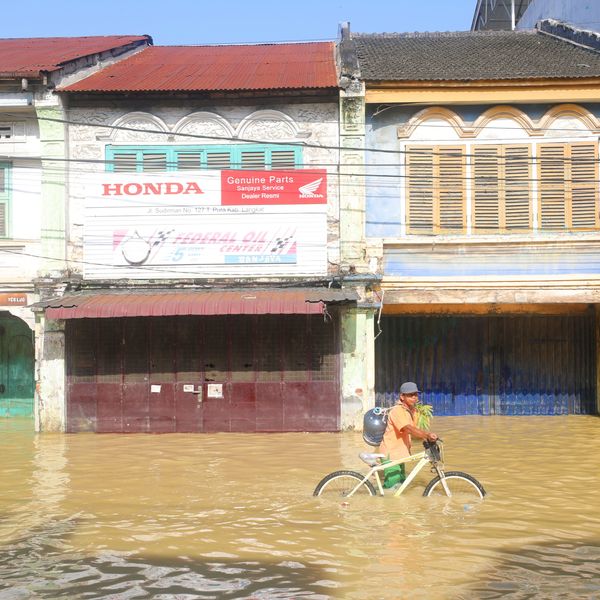Wildfires Rage Across Tasmania As Australia Swelters Under Heatwave
Heat, wind, drought bring firey conditions to nation
Wildfires continued to rage on Sunday across the Australian island state of Tasmania as large swathes of the country sizzled under heatwaves.
The wildfires that began on Thursday have left thousands stranded, at least 100 people missing and have firefighters fearing some of the missing may have died in the fires.
BBC News reports:
Much of Australia is experiencing a heatwave, and temperatures in the Tasmanian state capital Hobart earlier reached a record high of 41C. [. . .]
The BBC's Nick Bryant in Sydney says large swathes of south-east Australia are suffering from the worst fire conditions since the Black Saturday disaster almost four years ago, when 173 people in rural Victoria lost their lives.
He says there has been a combination of a record-breaking heatwave, high winds and drought, with Tasmania by far the worst hit.
Al Jazeera adds:
Bushfires are raging in many parts of Australia as the country experiences one of its most intense heatwaves in the last half century.
Some 80 percent of the country is in the grips of the heatwave, believed to have its origins in the Pilbara region of Western Australia. Settled weather conditions, aided by significantly above-average water temperatures along the coast have fed exceptionally warm air across the continent.
"It's very clear that the whole of southern Australia is experiencing a quite profound change in the seasonal cycle of rainfall," Dr. Jones of Australia's Weather Bureau said.
The Guardian has video:
An Urgent Message From Our Co-Founder
Dear Common Dreams reader, The U.S. is on a fast track to authoritarianism like nothing I've ever seen. Meanwhile, corporate news outlets are utterly capitulating to Trump, twisting their coverage to avoid drawing his ire while lining up to stuff cash in his pockets. That's why I believe that Common Dreams is doing the best and most consequential reporting that we've ever done. Our small but mighty team is a progressive reporting powerhouse, covering the news every day that the corporate media never will. Our mission has always been simple: To inform. To inspire. And to ignite change for the common good. Now here's the key piece that I want all our readers to understand: None of this would be possible without your financial support. That's not just some fundraising cliche. It's the absolute and literal truth. We don't accept corporate advertising and never will. We don't have a paywall because we don't think people should be blocked from critical news based on their ability to pay. Everything we do is funded by the donations of readers like you. Will you donate now to help power the nonprofit, independent reporting of Common Dreams? Thank you for being a vital member of our community. Together, we can keep independent journalism alive when it’s needed most. - Craig Brown, Co-founder |
Wildfires continued to rage on Sunday across the Australian island state of Tasmania as large swathes of the country sizzled under heatwaves.
The wildfires that began on Thursday have left thousands stranded, at least 100 people missing and have firefighters fearing some of the missing may have died in the fires.
BBC News reports:
Much of Australia is experiencing a heatwave, and temperatures in the Tasmanian state capital Hobart earlier reached a record high of 41C. [. . .]
The BBC's Nick Bryant in Sydney says large swathes of south-east Australia are suffering from the worst fire conditions since the Black Saturday disaster almost four years ago, when 173 people in rural Victoria lost their lives.
He says there has been a combination of a record-breaking heatwave, high winds and drought, with Tasmania by far the worst hit.
Al Jazeera adds:
Bushfires are raging in many parts of Australia as the country experiences one of its most intense heatwaves in the last half century.
Some 80 percent of the country is in the grips of the heatwave, believed to have its origins in the Pilbara region of Western Australia. Settled weather conditions, aided by significantly above-average water temperatures along the coast have fed exceptionally warm air across the continent.
"It's very clear that the whole of southern Australia is experiencing a quite profound change in the seasonal cycle of rainfall," Dr. Jones of Australia's Weather Bureau said.
The Guardian has video:
Wildfires continued to rage on Sunday across the Australian island state of Tasmania as large swathes of the country sizzled under heatwaves.
The wildfires that began on Thursday have left thousands stranded, at least 100 people missing and have firefighters fearing some of the missing may have died in the fires.
BBC News reports:
Much of Australia is experiencing a heatwave, and temperatures in the Tasmanian state capital Hobart earlier reached a record high of 41C. [. . .]
The BBC's Nick Bryant in Sydney says large swathes of south-east Australia are suffering from the worst fire conditions since the Black Saturday disaster almost four years ago, when 173 people in rural Victoria lost their lives.
He says there has been a combination of a record-breaking heatwave, high winds and drought, with Tasmania by far the worst hit.
Al Jazeera adds:
Bushfires are raging in many parts of Australia as the country experiences one of its most intense heatwaves in the last half century.
Some 80 percent of the country is in the grips of the heatwave, believed to have its origins in the Pilbara region of Western Australia. Settled weather conditions, aided by significantly above-average water temperatures along the coast have fed exceptionally warm air across the continent.
"It's very clear that the whole of southern Australia is experiencing a quite profound change in the seasonal cycle of rainfall," Dr. Jones of Australia's Weather Bureau said.
The Guardian has video:

